高中英语Unit4GlobalwarmingWarmingupandreading1课件新人教版选修
- 格式:ppt
- 大小:3.16 MB
- 文档页数:39
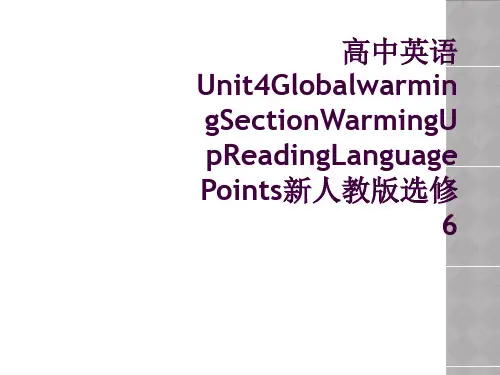
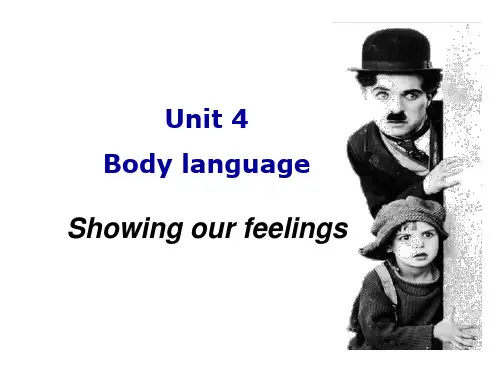

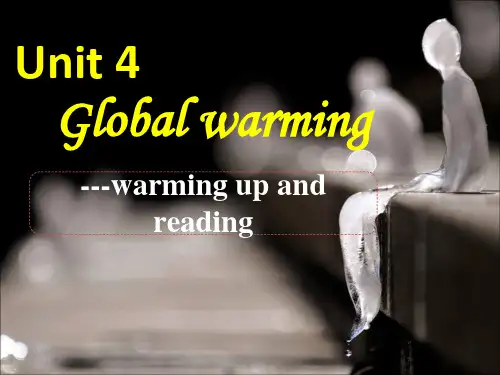
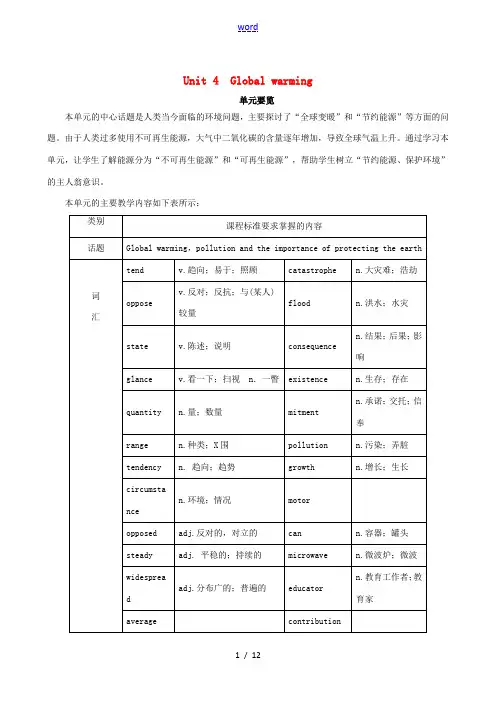
Unit 4 Global warming单元要览本单元的中心话题是人类当今面临的环境问题,主要探讨了“全球变暖”和“节约能源”等方面的问题。
由于人类过多使用不可再生能源,大气中二氧化碳的含量逐年增加,导致全球气温上升。
通过学习本单元,让学生了解能源分为“不可再生能源”和“可再生能源”,帮助学生树立“节约能源、保护环境”的主人翁意识。
本单元的主要教学内容如下表所示:Period 1 Warming Up,Pre-reading,Reading and prehending整体设计教学内容分析This is the first teaching period of this unit.The central part of this period is the reading passage with the title of “The Earth Is Being Warmer—But Does It Matter?” talking about the global issue which has a great effect on human beings' life.Warming Up gives six pictures to help students list the sources of energy they can think of in our daily life.Then they will be led to discuss which energy source is “renewable” and which is “non-renewable”.This part is designed to help the students to recall their background knowledge about energy and prepares students for the whole unit.Pre-reading provides a picture of a greenhouse and then tells us what a greenhouse is and what “greenhouse gases” are.The students will be led to discuss what they think greenhouse gases do,leading to the topic of the reading passage.Reading is a passage from an environmental magazine for young people.It puts forward the possible effect of increased carbon dioxide in the atmosphere and different points of view about it.It also analyzes the causes of the earth's increased temperature.It poses questions and encourages students to think about the issues.There are two graphs in it that tell us the “temperature difference from long-term average,1860-2000” and “carbon dioxide content in the atmosphere,1957-1997”.Characters in the passage—Dr Janice Foster,George Hambley and Charles Keeling are all real persons and their views reflect the views of some scientists today.prehending consists of three written or oral exercises for the students to do so as to help the students to get a better understanding of the text,that is to say,to help the teacher to check how much the students have understood the text.三维目标设计Knowledge and skills1.To know the meanings of the following new words and phrases:consume(消费;消耗;耗尽),e about(发生;造成),random(胡乱的;任意的),phenomenon(现象),subscribe(同意;捐赠;订阅;签署文件),subscribe to(同意;赞成;订购),fuel(燃料),quantity(量;数量),quantities of (大量的),tend(趋向;易于;照顾),go up(上升;增长;升起),per(每;每一),data(资料;数据),result in(导致),trend(趋势;倾向),catastrophe(大灾难;浩劫),flood(洪水;洪灾),oppose(反对;反抗),opposed(反对的;对立的),be opposed to(反对),consequence(结果;后果),state(陈述;说明),range(种类;X围),even if(即使),keep on(继续),glance(看一下;扫视),steady(平稳的;持续的),steadily(平稳地,持续地)2.To learn about some facts and views about global warming.3.To learn how the information is organized.4.To develop the students' reading ability by skimming and scanning the passage.5.To develop the students' speaking ability by talking about global warming.Process and methods1.While doing Warming Up the teacher can lead in the topic of this unit by showing students some pictures or videos about sources of energy,making the students recall their own knowledge about energy.2.During Pre-reading the teacher can go around the classroom and discuss the questions with several students.This discussion should be student-centered and lead them to the topic of global warming.The teacher should also ask the students to look at the graphs in the reading passage and try to find out the general idea of the text.3.While doing Reading and prehending,the teacher may first ask the students to read the text quickly to get the general idea of each paragraph.After reading the passage,students are encouraged to answer some questions and discuss the text structure.4.To consolidate the contents of the reading passage,the students should be required to retell the text in their own words at the end of the class.Emotion,attitude and value1.To make students realize the harm of global warming and the importance of environmental protection.2.To develop students' sense of cooperative learning.教学重、难点1.To enable the students to learn about global warming and to develop their reading ability.2.To enable the students to talk about what we should do to prevent global warming.教学过程Step 1Warming up1.Warming up by reading and talking:Read through the exercise with the class.Put students in groups of four to talk about what we use energy for,what are the sources of these energy and whether the sources are renewable or non-renewable.Suggested answer:The six photos are:windmills;a coal power station;an oil refinery;a nuclear power plant;solar panels;a hydro-electric dam.2.Warming up by discussion:Draw a form on the blackboard as follows:Things that useSources of energy Renewable/non-renewableenergyLet the students have a discussion and collect suggestions from students and write them under the appropriate heading.Suggested answer:Things that use energy Sources of energy Renewable/non-renewablelightsheatingtelevision cassette player video recorderputerfridgestovehairdryer...coal non-renewableoil non-renewable natural gas non-renewable wind power renewable solar energy renewable nuclear energy non-renewable hydro-electricpowerrenewable biomass energy renewable geothermalenergyrenewable tidal energy renewableStep 2Pre-reading1.Show a picture of a greenhouse to students and ask them what a greenhouse is made of and what its purpose is.Suggested answer:It's made of glass and plants can grow in it when it's cold outside.Ask the students how it works.Suggested answer:The glass traps the heat from the sun,making the air warm so that plants grow better.2.Ask students what they think “greenhouse gases” are and what they think greenhouse gases do.Look at the picture above and explain it to their partners.Suggested answer:Greenhouse gases perform the same function as the glass in a glasshouse:they trap the heat of the sun and keep the air surrounding the earth warm.This is called the greenhouse effect.)Step 3Reading and prehending1.Fast readingAsk students to read the passage quickly so as to get the key words and general idea of each paragraph and answer the following questions:(1)What is the main topic of the article?________________________________________________________________________(2)Who wrote the magazine article?What is the name of the magazine?________________________________________________________________________(3)What are the names of the three scientists mentioned in the article?Do they agree with one another?________________________________________________________________________Suggested answers:(1)Global warming/the warming of the earth.(2)Sophie Armstrong,Earth Care.(3)Dr Janice Foster,Charles Keeling,George Hambley.They don't agree with each other.2.Detailed reading(1)Read the passage carefully and judge whether the statements are true(T) or false(F).①Janice Foster believ es that global warming is caused by the burning fossil fuels.( )②Natural gas is a greenhouse gas.()③Carbon dioxide is a byproduct of burning fossil fuels.()④People accept Charles Keeling's data because he took accurate measurements.()⑤Flooding could be one of the effects of future global warming.( )⑥George Hambley believes scientists are just guessing about the effects of global warming.( )⑦George Hambley is worried about the effects of carbon dioxide on plant growth.()⑧It is clear what the effec ts of global warming will be.( )(Suggested answers:TFTTTTFF)3.Structure analyzingAsk students to read the text carefully and try to find out how many parts they can divide the text into and find out the main idea of each part.Part Main ideaPart 1(Paragraph ______)Part 2(Paragraphs ______ to ______)Part 3(Paragraphs ______ to ______)Part 4(Paragraph ______)Suggested answer:Part Main ideaPart 1(Paragraph 1) To introduce a debate over the issue of global warming.Part 2(Paragraphs 2 to 5) To illustrate how global warming es about.To list two different attitudes among scientists towards Part 3(Paragraph 6)global warming.It's up to readers to think and decide whether people Part 4(Paragraph 7)should do something about global warming or not.Step 4Language studyDealing with any language problem if any(words or sentences students might not understand)to help the students to have a better understanding of the text.Step 5Listening,reading aloud and underliningAsk students to read the passage aloud to the tape and let them pay attention to the pronunciation of each word and the pauses within each sentence.Tell them to pick out all the useful expressions or collocations from the passage while reading and copy them to the notebook after class as homework.Collocations:e about,There is no doubt that...,subscribe to,due to,greenhouse effect,quantities of,tend to,be trapped in,go up,result in,on the one hand...on the other hand,be opposed to,build up,keep on.Step 6RetellingAsk students to talk about global warming in their own words.Give them some key words and expressions on the blackboard.Then let them try to retell the passage.Step 7Homework1.Learn the useful new words and expressions in this part by heart.2.Try to find some data about global warming on the Internet,and show your class in the next period and talk about them.Step 8Reflection after teaching________________________________________________________________________________________________________________________________________________教学参考About Global Warming(关于全球变暖)Global warming is the increase in the average temperature of Earth's near-surface air and oceans since the mid-20th century and its projected continuation.Global surface temperature increased 0.74±0.18℃(1.33±0.32)between the start and the end of the 20th century.The Intergovernmental Panel on Climate Change(IPCC)concludes that most of the observed temperature increase since the middle of the 20th century was very likely caused by increasing concentrations of greenhouse gases resulting from human activity such as fossil fuel burning anddeforestation.The IPCC also concludes that variations in natural phenomena such as solar radiation and volcanic eruptions had a small cooling effect after 1950.These basic conclusions have been endorsed by more than 40 scientific societies and academies of science,including all of the national academies of science of the major industrialized countries.Climate model projections summarized in the latest IPCC report indicate that the global surface temperature is likely to rise a further 1.1 to 6.4℃(2.0 to 11.5)during the 21st century.The uncertainty in this estimate arises from the use of models with differing sensitivity to greenhouse gas concentrations and the use of differing estimates of future greenhouse gas emissions.Most studies focus on the period up to the year 2100.However,warming is expected to continue beyond 2100 even if emissions stop,because of the large heat capacity of the oceans and the long lifetime of carbon dioxide in the atmosphere.An increase in global temperature will cause sea levels to rise and will change the amount and pattern of precipitation,probably including expansion of subtropical deserts.Warming is expected to be strongest in the Arctic and would be associated with continuing retreat of glaciers,permafrost and sea ice.Other likely effects include changes in the frequency and intensity of extreme weather events,species extinctions,and changes in agricultural yields.Warming and related changes will vary from region to region around the globe,though the nature of these regional variations is uncertain.Political and public debate continues regarding global warming,and what actions(if any)to take in response.The available options are mitigation to reduce further emissions;adaptation to reduce the damage caused by warming;and,more speculatively,geoengineering(地球工程)to reverse global warming.Most national governments have signed and ratified the Kyoto Protocol aimed at reducing greenhouse gas emissions.。
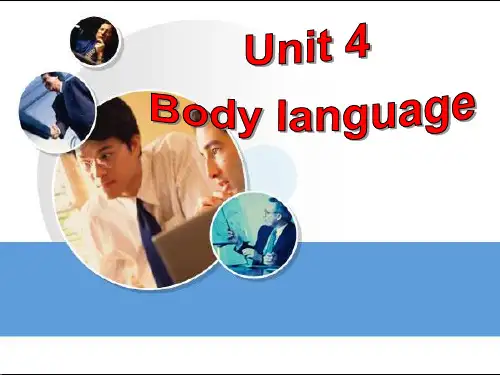
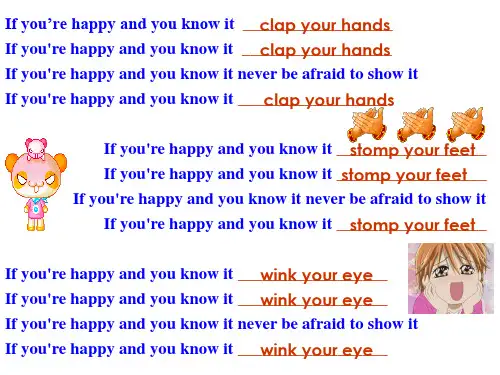
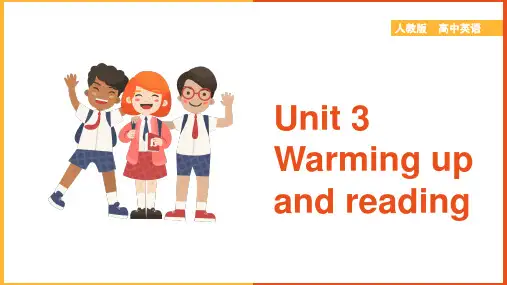
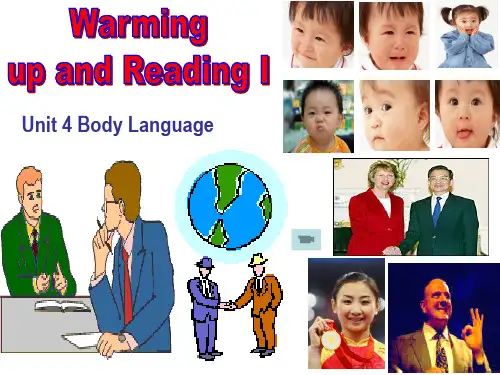
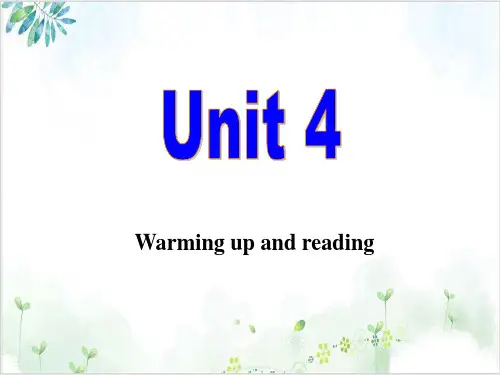
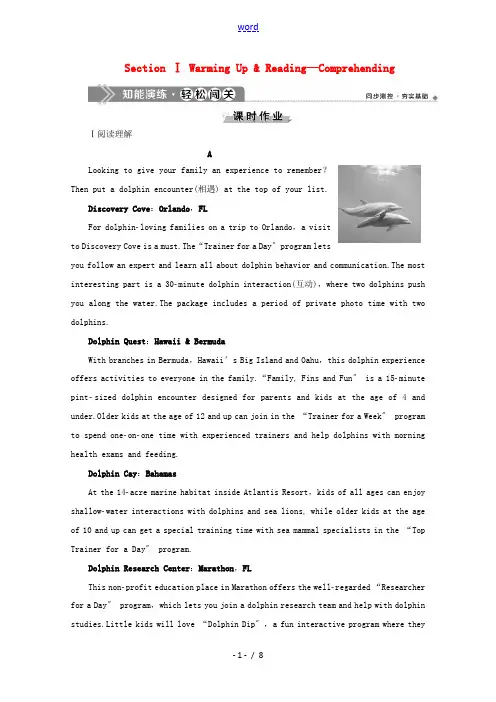
Section Ⅰ Warming Up & Reading—ComprehendingⅠ阅读理解ALooking to give your family an experience to remember?Then put a dolphin encounter(相遇) at the top of your list.Discovery Cove:Orlando,FLFor dolphinloving families on a trip to Orlando,a visitto Discovery Cove is a must.The“Trainer for a Day〞program letsyou follow an expert and learn all about dolphin behavior and communication.The most interesting part is a 30minute dolphin interaction(互动),where two dolphins push you along the water.The package includes a period of private photo time with two dolphins.Dolphin Quest:Hawaii & BermudaWith branches in Bermuda,Hawaii’s Big Island and Oahu,this dolphin experience offers activities to everyone in the family.“Family, Fins and Fun〞 is a 15minute pintsized dolphin encounter designed for parents and kids at the age of 4 and under.Older kids at the age of 12 and up can join in the “Trainer for a Week〞 program to spe nd oneonone time with experienced trainers and help dolphins with morning health exams and feeding.Dolphin Cay:BahamasAt the 14acre marine habitat inside Atlantis Resort,kids of all ages can enjoy shallowwater interactions with dolphins and sea lions, while older kids at the age of 10 and up can get a special training time with sea mammal specialists in the “Top Trainer for a Day〞 program.Dolphin Research Center:Marathon,FLThis nonprofit education place in M arathon offers the wellregarded “Researcher for a Day〞 program,which lets you join a dolphin research team and help with dolphin studies.Little kids will love “Dolphin Dip〞,a fun interactive program where theycan greet dolphins with flipper(脚蹼) shakes and learn to give dolphins signals.【解题导语】本文是一篇应用文。
Unit4GlobalwarmingSection1SectionⅠWarming up,Pre-reading,Reading&ComprehendingⅠ.用所给词的适当形式填空Ⅰ.用所给词的适当形式填空1.In the atmosphere surrounding (surround) the earth are g reenhouse gases.2.He is lucky when compared (compare) with me.3.He is opposed (oppose) to my view.4.He acts freely without considering consequences (conse quence).5.The temperature keeps going (go) up steadily (steady) when spring comes.6.Smoking does great harm (harmful) to health.7.I'd like to buy quantities (quantity) of books for the childre n.8. Natural (nature) gas has taken the place of coal for coo king and heating.9.People have a strong belief (believe) that life is improving .10.More carbon dioxide is actually a positive thing because i t will make plants grow quicker (quick).Ⅱ.用方框内所给单词的适当形式填空come about, subscribe to, quantities of, go up, result in , be opposed to, even if, keep on, result from, it is stat ed that1.The rainstorm resulted in the death of 41 persons. 2.His political views are directly opposed to mine.3. It is stated that he has asked for his cards.4.How did this come about ?5.Disease often resulted from poverty.6.If the prices continue to go up ,we can't afford anything. 7.He did not subscribe to my proposal.8.She's always trying to keep on good terms with her neigh bors.9.We've had quantities of rain this summer.10. Even if I have to walk all the way I'll get there.Ⅲ.单句改错1.I don't know of anything to keep you smoking. ( 在you之后加from )2.He will sell his house why he needs money.( why→because )3.He spoke so loudly as to make himself understand. ( und erstand→understood )4.There is no doubt what English is very important. ( what→t hat )5.It is I who is to blame for the accident. ( 第二个is→am )Ⅳ.完成句子1.I don't approve of (赞同)your view.2.He would walk to school rather than (而不)take a bus. 3. Are you opposed to (反对)his going there alone? 4.Have you heard of the accident resulting in (造成)10 deaths?5. Even if (即使)he doesn't come,we can manage to finish the work in time.Ⅴ.句型转换1.Surely our teacher will come to help us.→ There is no doubt that our teacher will come to help us. 2.Greenhouse gases continue to build up in the atmosphere .→ It is greenhouse gases that continue to build up in the at mosphere.3.I believe that your work will be recognized by your boss.→ It is my belief that your work will be recognized by your b oss.4.In spite of our help,he will still fail.→ Even if we help him,he will still fail.Ⅵ.完形填空(2017·全国Ⅱ)In 1973, I was teaching elementary school. Each day, 27 kids 1.B“The Thinking Laboratory.” That was the 2.A students vot ed for after deciding that “Room104” was too 3.D . Freddy was an average 4.B , but not an average person. He had the rare balance of fun and compassion(同情).He would 5.D the loudest over fun and be the sadde st over anyone's 6.A .Before the school year 7.D , I gave the kids a special 8.B , T-shirts with the words “Verbs Are Your 9.A ” on them. I had advised the kids that while verbs(动词)may seem dull, most of the 10.C things they do throug hout their lives will be verbs.Through the years, I'd run into former students who would provide 11.D on old classmates. I learned that Freddy did se veral jobs after his 12.A from high school and remained t he same 13.C person I met forty years before .Once, whil e working overnight at a store, he let a homeless man 14.B in his truck. Another time, he 15.C a friend money to buy a house.Just last year, I was 16.D a workshop when someone kn ocked at the classroom door. A woman 17.C the interrupt ion and handed me an envelope. I stopped teaching and 1 8.A it up. Inside were the “Verbs” shirt and a 19.C from Freddy's mother. “Freddy passed away on Thanksgiving. He wanted you to have this.”I told the story to the class. As sad as it was, I couldn't help s miling. Although Freddy was taken from us, we all 20.B s omething from Freddy.文章大意:本文是一篇记叙文。